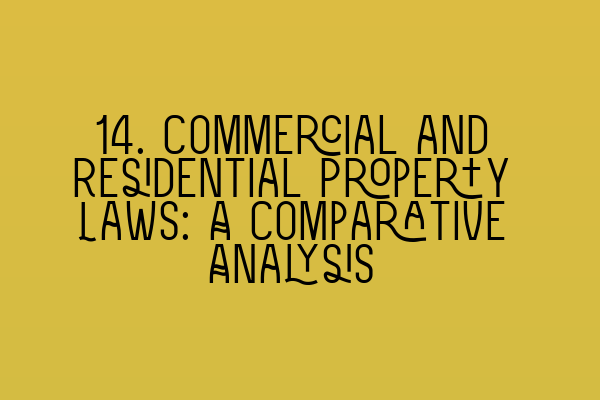14. Commercial and Residential Property Laws: A Comparative Analysis
Welcome to SQE Property Law & Land Law blog! In today’s post, we will delve into the fascinating world of commercial and residential property laws, providing a comparative analysis to offer you a deeper understanding of the key differences between these two areas of law. So, whether you’re studying for the SQE exams or just have a general interest in property law, sit back, relax, and let’s explore!
Introduction
Property law is a complex and multifaceted field that encompasses various types of real estate transactions. Two prominent categories within property law are commercial and residential properties, each with its unique set of principles and regulations. From leasing agreements to property development, understanding the differences between the two is crucial for legal practitioners and individuals involved in the property market.
Commercial Property Laws
Commercial property law primarily focuses on transactions related to properties intended for business purposes. These can include office spaces, retail stores, industrial buildings, and more. The main features of commercial property law include:
1. Lease Agreements: Commercial lease agreements tend to be more intricate and longer in duration compared to residential leases. They often involve negotiation on terms such as rent, maintenance responsibilities, and permitted use of the property.
2. Landlord and Tenant Relationships: The relationships between commercial landlords and tenants are governed by specific laws that require both parties to adhere to their contractual obligations. These laws aim to balance the rights and responsibilities of both parties.
3. Planning and Zoning Laws: Commercial properties are subject to planning and zoning laws that dictate the use of land, building permits, and the overall development of the area. Compliance with these regulations is essential to ensure lawful operation.
Residential Property Laws
Residential property law, on the other hand, revolves around the legal aspects of properties used as homes by individuals and families. Some key aspects of residential property law include:
1. Tenancy Agreements: Residential tenancy agreements are typically shorter in duration and structured to protect the rights of both landlords and tenants. They cover areas such as rent, maintenance, and termination of the tenancy.
2. Landlord and Tenant Relationships: Residential landlords must comply with specific laws that aim to safeguard the rights of tenants, such as providing habitable living conditions, maintaining the property, and handling security deposits.
SQE 1 Practice Exam Questions
SQE 1 Practice Mocks FLK1 FLK2
SQE 2 Preparation Courses
3. Residential Conveyancing: The process of buying and selling residential properties involves extensive legal procedures, such as conducting searches, drafting contracts, and ensuring the necessary documentation is in order.
Comparative Analysis
Now that we have explored the key components of commercial and residential property laws, let’s analyze the differences between the two:
1. Legal Considerations: Commercial property laws tend to be more complex compared to residential property laws due to the nature of business transactions involved. The contractual terms and negotiations in commercial leasing agreements are more intricate, often requiring legal expertise to ensure fair and equitable terms for both parties involved.
2. Financial Implications: Commercial properties usually involve higher financial investments and substantial agreements, making the financial stakes higher for all parties concerned. In contrast, residential properties generally have a lower financial threshold and are often subject to specific regulations aimed at protecting tenants.
3. Legal Disputes: Disputes arising from commercial and residential properties can differ significantly in nature. Commercial property disputes are often related to breaches of lease agreements, non-payment of rent, or disputes over property development. Residential property disputes, on the other hand, can involve issues such as lease violations, eviction proceedings, or breaches of habitability standards.
Conclusion
In a nutshell, commercial and residential property laws differ significantly in terms of legal considerations, financial implications, and the types of disputes that may arise. Understanding these differences is crucial for legal professionals and individuals involved in the property market.
SQE 1 Preparation Courses
SRA SQE Exam Dates
By grasping the nuances between commercial and residential property laws, legal practitioners can effectively advise their clients, negotiate lease agreements, assist with property transactions, and handle any potential legal disputes that may arise.
We hope this comparative analysis has shed light on the distinct aspects of commercial and residential property laws. For more information and preparation resources for the SQE exams, be sure to check out our related articles:
– SQE 1 Practice Exam Questions
– SQE 1 Practice Mocks FLK1 FLK2
– SQE 2 Preparation Courses
– SQE 1 Preparation Courses
– SRA SQE Exam Dates
Remember, the more you understand the intricacies of property law, the better equipped you will be to navigate the complex world of commercial and residential real estate transactions. Stay tuned for more insightful content from SQE Property Law & Land Law blog!
